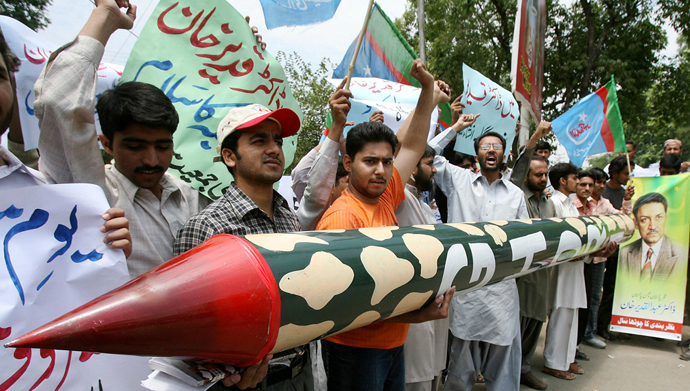
Point, Counter-Point: A Four Part Series
The Wisest Choice, by Abhijit Iyer-Mitra
Normalizing Nuclear Pakistan, by Rabia Akhtar
After the Euphoria? by Amina Afzal
Overlooking’ Pakistan’s Nuclear Dangers, by Aditi Malhotra and Sitakanta Mishra
***
Even as it expresses concern about Pakistan’s nuclear arsenal being the fastest growing in the world, Mark Fitzpatrick’s recently launched book “Overcoming Pakistan’s Nuclear Dangers” urges western powers to negotiate a nuclear deal with Pakistan as a way to reduce the dangers emanating from the country. The book seems to have taken center-stage in the country’s strategic discussions. Many in Pakistan are touting the recommended nuclear deal between western powers and Pakistan as a significant proposal — one that would be highly beneficial for the country. However the proposal is not that simplistic and far from yielding the strategic benefits Pakistan seeks to gain. Interestingly the deal would be similar to the one offered to India but “given that Pakistan has more to atone for” and is unable to match India’s “strategic benefit”, the agreement in this case would constitute different terms.
The proposed deal with Pakistan rests on a number of factors including its ability to prove itself as a reliable nuclear state. In the author’s words thus “…they should be ready to recognize Pakistan as a normal nuclear state and to offer nuclear cooperation, if it adopts policies associated with responsible nuclear behavior.” To this end also the author expresses his confidence in Pakistan’s nuclear policy albeit with a few problems. Fitzpatrick writes that Pakistan’s declared policy of using nuclear weapons in response to a conventional attack is inconsistent with what is considered as responsible nuclear behavior. The book goes on to identify the brewing nuclear arms race between India and Pakistan as a greater problem than the potential for nuclear terrorism. Both India and Pakistan are not trying to match numbers or systems vis-à-vis the other but are instead focusing on fissile material production capabilities and the relative sophistication of their delivery platforms. This kind of competition represents a greater problem as “it lends itself less easily to arms control agreements.” In other areas too the author recognizes Pakistan’s efforts towards responsible nuclear behavior but highlights its inability to deal with the growing problem of terrorism and how terrorist activity can spark a nuclear conflict between India and Pakistan.
Notwithstanding these problems the author has suggested that the time is ripe for a nuclear deal with Pakistan in order to “positively shape Pakistan’s nuclear posture.” To gain from such a deal Pakistan would at the very least be expected to end its veto of initiating FMCT discussions. However he also highlights an apparent paradox – an NSG exemption alone will not be enough to convince Pakistan of the merits of supporting an FMCT. The country has specified other conditions in order for it to consider supporting an FMCT. Pakistan’s demand of addressing existing stockpiles in order to reduce asymmetries remains pertinent and the country is unlikely to limit its production of fissile material until it believes it has sufficient stockpiles for credible deterrence.
The author also envisions Pakistan’s agreement to sign the CTBT but this decision depends on numerous factors. Agreeing to western demands would undoubtedly limit Pakistan’s ability to produce more fissile material, which from the Pakistani perspective would be akin to limiting its very sovereignty. The author himself is doubtful of Pakistan signing the CTBT or adhering to any other arms control effort before India does so because of domestic political concerns.
It is too soon for Pakistan to be jubilant over an overvalued proposal, one, which may seem beneficial but carries long-term implications which may not be in Pakistan’s favour after all. For example would Pakistan also be accorded a deal similar to the one offered to India, whereby its civil nuclear programme will be delinked from its military one? Pakistan’s contention with the NSG waiver for India was not merely about the acquisition of civil nuclear energy from the west, it was based instead on the demand for a non-discriminatory nuclear policy for South Asia. That the deal was in clear violation of the NPT remains another significant problem for the western world to think about.
***
Image: Arif Ali-AFP, Getty